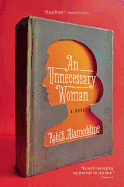
Lebanese-American writer Rabih Alameddine is best known for The Hakawati (2008), a fabulously inventive novel splicing classic and reimagined Middle Eastern tales with his modern protagonist's stories and memories. The narrative of An Unnecessary Woman may be more conventional, but it soars with passion, intelligence and literary celebration. The novel's constants are Alameddine's unswerving devotion to a crumbling Beirut, his belief in the ability of books to guide us through the most human of experiences and his compassion for his characters.
Childless, divorced and estranged from her traditional Lebanese family, Aaliya Sohbi has finally retired from her job at a bookstore in Beirut. A recluse, she prefers her memories and her solitary practice of translating her favorite books--English translations of international classics--into Arabic, a double remove that reverberates throughout the story. When she finishes each translation, she seals the handwritten pages into boxes stored in an overflowing corner of her apartment.
Books are the lens through which Aaliya understands her life; her memories and observations the novel's connective tissue. One at a time, each a small, dazzling world, they suggest the reasons for her isolation. When war and family intrude on her fragile existence, she is faced with the possibility of participating fully in a life that is not, after all, so small--and accepting that her creative expression matters despite its invisibility.
Full of humanity and compassion, An Unnecessary Woman is a paean to books, the need to create and the surprise of life. --Jeanette Zwart, freelance writer and reviewer

